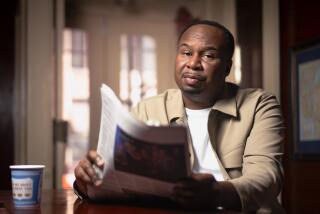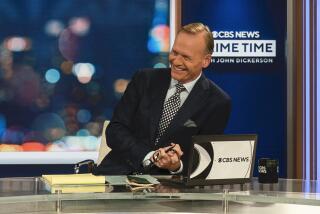Awaiting anchors away
Manchester, N.H. — New Hampshire primary night, of all nights, should see Tom Brokaw at the center of the action.
Instead, while a couple of hundred employees of NBC News and affiliated networks are fielding phones and typing away at laptops at the nearly 12,000-square-foot work space in the downtown Manchester Holiday Inn, Brokaw and a handful of producers are five miles away at the Bedford Village Inn, standing in an 18-foot-square box set up on the lawn.
Three sides are made of unadorned plywood and bags of insulation, the fourth a sheet of glass that NBC News’ lead anchor stands in front of, so viewers see the quaint, yellow, snow-covered inn behind him that screams “New Hampshire.” In the overheated booth are a dozen people including two cameramen and a makeup person to powder Brokaw’s brow during commercial breaks.
If his physical setup feels surreally detached from the action, on air, Brokaw is everywhere: anchoring “NBC Nightly News,” reporting news updates during NBC’s prime time, talking with colleague Tim Russert to add a more serious note to the freewheeling panel discussions on MSNBC, working through the night’s results on CNBC and interviewing Howard Dean for “Dateline NBC.” It puts him on the air every 15 minutes over more than four hours, a stint that will end only when he and his staff rush for a plane to take them to South Carolina, ahead of a big storm, so he can anchor a presidential candidates’ debate two days later, to be seen on MSNBC.
Four years earlier, Brokaw reminisces, he was in the same unglamorous booth interviewing George W. Bush, who had just lost the primary. Four years from now, he won’t be here at all, eating cold, coagulated chicken potpie and obsessively smoothing his jacket.
As Brokaw kicks off his final year at “NBC Nightly News,” one that will be dominated by the quadrennial rituals of campaign coverage, it’s hard not to see a metaphor in the anchorman who is everywhere and nowhere at the same time.
For nearly two years, the TV news industry has been contemplating the seismic event that is Brokaw’s imminent retirement and what it will mean for dominant NBC News, even the future of network evening newscasts. Rumors -- perhaps wishful thinking by his friends? -- regularly circulate that he’s having second thoughts and will change his mind; who would voluntarily give up that much power and fame? ABC and CBS executives are wondering what it will mean for their own competitive positions and are strategizing to take advantage of the coming upheaval. NBC is readying replacement Brian Williams.
Brokaw’s departure will cap a year that is shaping up to represent an enormous changing of the guard in network television news. Don Hewitt, the creator of CBS’ “60 Minutes,” the granddaddy of television newsmagazines, steps down from day-to-day control of the show in May. Barbara Walters, the first female anchor of an evening newscast, recently announced she would retire from ABC’s “20/20” in September to concentrate on specials; she had been talking to Brokaw about the decision for a year. It seems likely that there are more changes to come as an entire generation of TV news stars reaches, even surpasses, retirement age.
But it is Brokaw’s departure, which was his idea -- he wants more personal freedom and time to work on documentary projects -- that will likely reverberate. Like his counterparts, Dan Rather of the “CBS Evening News” and Peter Jennings of “ABC World News Tonight,” he has been in the anchor chair for two decades. For an entire generation that gets most of its news from television, his is one of the three omnipresent faces in moments of national crisis.
When each ascended to the chair, CNN was in its infancy, still struggling, and MSNBC, CNBC and Fox News Channel didn’t even exist. Nor did the Internet, for the average person. Conventional wisdom is that no one will ever be able to replicate the sense of familiarity that many feel with each of the three men. And as long as they are there, the thinking goes, no owner would dare pull the plug on the nightly news. But when they leave, all bets are off, although how the newscasts would evolve or where they would move isn’t clear.
Going out on top
Brokaw’s departure is doubly intriguing because for several years now, he has been at the top of his game. Changes at “Nightly News” helped it surpass ABC’s “World News Tonight” in 1997, and it has never lost the lead, although ABC has made demographic gains in the past year. Brokaw’s books on “the greatest generation” -- the World War II veterans and their families -- were their own phenomenon, selling millions of copies. The stain of election night 2000 -- with its wrong projections -- has been erased by the hours of commendable coverage on Sept. 11, 2001. That terrorist attack and the fallout persuaded Brokaw to stick around for a couple of years more than he had originally planned.
Purists have grumbled about the changes NBC made to move into first place, but Brokaw isn’t abashed about them. The newscast is no longer overseas- and Washington-centric, but instead deals with health, technology and investments -- what some decry as “soft” news. Brokaw expresses no longing for the days of the “precious little piece on the Scottish shepherd, which was elitist and inside,” or of covering congressional hearings that he calls “Kabuki dances of the highest order. It was a lazy way of covering the news and feeling respectable about it.” And when a big international story has hit, he says, “We’ve covered the hell out of it.”
Indeed, the day before the New Hampshire primary, U.S. weapons inspector David Kay has arrived to talk about his report on the absence of weapons of mass destruction in Iraq, his only network news interview up until then. He has flown from Washington, D.C., to Boston, then driven the hour north to Manchester. Sitting before a brightly burning fire, Brokaw and Kay talk for about 40 minutes, for a “Nightly News” report that will air that night. It will run more than five minutes, an extraordinarily long report in a broadcast of just 22 minutes.
“It’s a measure of the high esteem I have for him,” says Kay, explaining why he has come so far for the interview, which he could have done by satellite. Brokaw, he says, “is prepared for complexity and this is a hard story to tell.”
The last two years of wars and terror attacks have stopped the audience loss at the evening newscasts and Brokaw is drawing about 11.7 million viewers on average per night, Jennings 10.8 million and Rather about 9 million, compared to about 2.5 million viewers in prime time in January for the three cable news networks combined.
Network executives get exasperated at the constant death knell sounded for the programs but, unable to predict whether the younger Web-savvy generation will even want Brokaw’s type of authority-figure-news in the future, are also hedging their bets.
NBC invested in 24-hour cable news, forming MSNBC, which last week underwent a management shake-up to make the struggling network more competitive. And NBC is making the most of the new world order by leveraging stars such as Brokaw and Russert on its other channels. ABC is putting resources into online news and offering its programs over the Internet.
On primary night, Brokaw signals the ambivalence many in the business feel with the new way of doing things by telling jokes at the expense of cable. Waiting at one point to go on-air, he cracks up Russert, noting: “You’ve got to learn to do that cable head-nod thing, that says, ‘I’m here, I’m on television and I’m an expert whether I am or not.’ ” Later, told by a producer that the two have to talk for a full 12 minutes on CNBC, Brokaw starts to do a dance shuffle and quips, “So a man walks into a bar in Buffalo ...”
What NBC clearly will be losing when Brokaw steps down is his ease with both the job and his colleagues, something that only comes with time. In the booth, he and Russert, normally based in Washington, have their routine down pat. They knock into each other on purpose, and try to make each other laugh; running down the topics they will cover, they talk in shorthand.
Looking to the future
The news of Brokaw’s retirement hasn’t yet reached many viewers, but then, he’s not set to leave until around Dec. 1.
Will viewers turn the channel to ABC or CBS? Turn to 24-hour cable or the Internet to get their news, thus hastening the demise of evening newscasts? Or will they shrug?
“It’s still getting sorted out,” is Brokaw’s verdict. As his post-anchor plans, he says he will “go away for a couple of months” spending time with his wife, Meredith, with whom he has three daughters. In his new life, he says, he’ll continue to address the big issues confronting TV news but “what I don’t want to do is just be ‘old church.’ ”
If there’s any sentimentality as he heads into the final months, Brokaw isn’t letting on. Indeed, he’s already tiring of the attention. Russert has a theory why: “No one likes to read their own premature obituary.”
They are rolling in nonetheless. Brokaw received a lifetime achievement award last December from the National Press Club. He was the honoree at the Museum of Television & Radio’s annual New York gala Feb. 19. Still to come is an honor for all three anchors at the International Radio and Television Society gala on March 16 and others.
The more private moments are hoopla-free. There was no toast at the last dinner with old pals in New Hampshire -- media luminaries Brokaw can see pretty much any time he wants in Manhattan or Washington, D.C., but who nonetheless have forged a special bond at their reunions preceding the political year’s first primary. When he attended his first one, in 1972, Brokaw was a young up-and-comer, an anchor at Los Angeles’ KNBC. Now, he says, at age 64, “I’m in the senior set.”
He had a great time, he says, “but I don’t have to do this again.” Will the viewers?
More to Read
The biggest entertainment stories
Get our big stories about Hollywood, film, television, music, arts, culture and more right in your inbox as soon as they publish.
You may occasionally receive promotional content from the Los Angeles Times.










